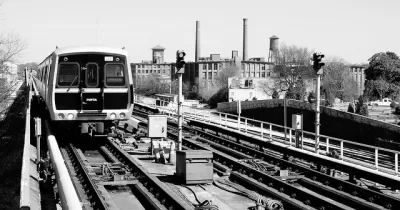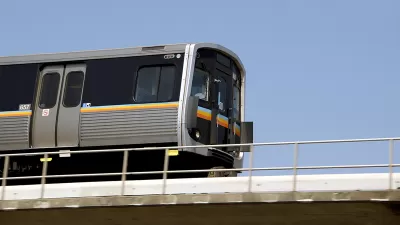Gwinnett County voters living have rejected proposals to pay taxes for the MARTA transit system before, so the latest proposal for a transit sales tax is going to great lengths to prove its local control bonafides.

David Pendered reports on the central role of the politics of local control to the transit sales tax on the ballot in November for voters in Gwinnett County, Georgia.
"MARTA will be involved only because state law requires it – and the role is restricted to heavy rail," writes Pendered. "MARTA is equally explicit in stating that Gwinnett County will exercise control over MARTA’s functions in Gwinnett through intergovernmental agreements. These agreements will help address the fact that Gwinnett County does not have a representative on MARTA’s board – because Gwinnett voters have rejected proposals to join MARTA."
According to Pendered, the transit sales tax proposal is designed to keep the revenue raised by the tax out of MARTA coffers, funding instead projects and programs favored by local officials.
The possibility of a regional approach to transit funding and planning has buried previous transit funding sales taxes proposed to Gwinnett County voters, despite the best rhetorical efforts of transit advocates in the Atlanta region.
In response to that history of reluctance to send tax money to a regional authority, "Gwinnett County’s official educational materials regarding the transit proposal – Your plan, Your vote, Your choice – has an entire section that’s titled, Local Control," explains Pendered.
The county has done more—a lot more in fact—to highlight the local control embedded in November's ballot proposal, as shown by Pendered in the source article.
FULL STORY: Gwinnett County transit vote: Local control is the watchword

Planetizen Federal Action Tracker
A weekly monitor of how Trump’s orders and actions are impacting planners and planning in America.

Maui's Vacation Rental Debate Turns Ugly
Verbal attacks, misinformation campaigns and fistfights plague a high-stakes debate to convert thousands of vacation rentals into long-term housing.

Restaurant Patios Were a Pandemic Win — Why Were They so Hard to Keep?
Social distancing requirements and changes in travel patterns prompted cities to pilot new uses for street and sidewalk space. Then it got complicated.

In California Battle of Housing vs. Environment, Housing Just Won
A new state law significantly limits the power of CEQA, an environmental review law that served as a powerful tool for blocking new development.

Boulder Eliminates Parking Minimums Citywide
Officials estimate the cost of building a single underground parking space at up to $100,000.

Orange County, Florida Adopts Largest US “Sprawl Repair” Code
The ‘Orange Code’ seeks to rectify decades of sprawl-inducing, car-oriented development.
Urban Design for Planners 1: Software Tools
This six-course series explores essential urban design concepts using open source software and equips planners with the tools they need to participate fully in the urban design process.
Planning for Universal Design
Learn the tools for implementing Universal Design in planning regulations.
Heyer Gruel & Associates PA
JM Goldson LLC
Custer County Colorado
City of Camden Redevelopment Agency
City of Astoria
Transportation Research & Education Center (TREC) at Portland State University
Jefferson Parish Government
Camden Redevelopment Agency
City of Claremont




























